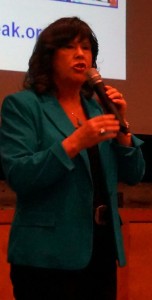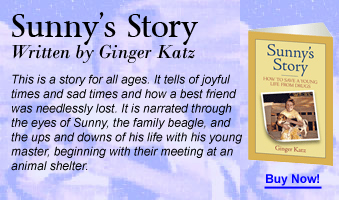
![]()
Norwalk mother delivers anti-drug message to Greenwich High students
Posted on April 11, 2014 By Paul Schott
Ginger Katz knows how to make a point to a large group.
That ability has come from a deep-seated passion and extensive public-speaking experience. But that career has tragic origins: Her 20-year-old son, Ian Eaccarino, died from an accidental heroin overdose in September 1996.
The same year, Katz and her husband, Larry, founded The Courage to Speak Foundation, which educates youth about drugs and encourages parents to speak with their children about drugs’ dangers. She has since delivered more than 1,000 presentations to hundreds of thousands of people, including students, teachers, parents, law-enforcement officials and clergy members.

Ginger Katz
Ginger Katz speaks Thursday at
Greenwich High School
On Thursday, Katz faced her latest audience: about 200 Greenwich High School students. During an hour-long talk in the school’s auditorium, Katz traced her son’s life story. He was a popular Norwalk High School student, who played lacrosse and baseball and earned a black belt in karate.
But by his early teenage years, Ian was already smoking, drinking and experimenting with marijuana.
“Tobacco, a sip of beer and a little weed is why I’m here today,” Katz said. “I don’t underestimate these drugs. These drugs opened up the floodgates to the drugs that killed Ian.”
Adolescents are particularly vulnerable to addiction, she said.
“A 30-year-old adult takes eight to 10 years to reach the chronic stages of alcoholism,” she said. “An adolescent can take fewer than 15 months, because their bodies are still growing. Addiction is very rapid in the teenage years. If you can get to 21, your chance of becoming addicted to any drugs is much slimmer.
“Addiction is an adolescent disease. There are millions of people in recovery today. Most of them will tell you they started as an adolescent.”
Ian’s struggles with substance abuse continued when he arrived at the University of Hartford. There, he was introduced to heroin.
“There were three boys one night in the dorm,” Katz said. “There was another young man who was a heroin addict, and he was a student. He gave these three boys this little packet. One got scared, one got sick and Ian got hooked.
“Five months later, Ian called his biological dad and said, ‘Dad, I’ve been snorting heroin for five months and every time I stop it’s like 20 times the strength of the flu, and my body hurts me. First, it was once on the weekend, and now it’s five times a day.’”
While Ian battled addiction, his parents were not passive. They put him in counseling the summer before he started college and constantly pushed him to give up drugs. His biological father checked him into a rehab center near the University of Hartford. But three days later, without telling his parents, Ian checked himself out. And, at one point, Ginger kicked him out of the house, when she found drug-dealing money in his tennis case.
Ian’s prospects improved with his junior-year transfer to the University of Connecticut’s Stamford branch, a location that allowed him to commute from home. By September 1996, he appeared to be finally ready to seek treatment. But the turnaround came too late.
“I said, ‘Ian, if you want my help, just ask,’” Katz said, recalling a conversation with him the night that he died. “He said, ‘Mom, I’ve got to see a doctor in the morning. I can’t do this.’ I said, ‘Do you want to go to the hospital now?’ He said, ‘That’s o.k., I’m going to go downstairs.
“And at 1:30 in the morning, I heard a door shut, and Ian came upstairs and I was awake. ‘I’m sorry, Mom,’ he said. I said, ‘What’s going on, Ian?’ He said, ‘It’s bigger than me. I don’t want to move in with my friends, I’ve got to take care of this.’ And I went to give him a hug, and he said, ‘I love you, Mom.’
“And at 4 o’clock, his dog, Sunny, climbed from his bed to my bed, to try to wake me up. Sunny’s message was undelivered. It was the best night’s sleep I had, because Ian said he was going to get help.
“I got up in the morning, and I found Ian. He didn’t have a second chance. He had gone downstairs and did heroin one more time, even with all the remorse and promises. It was bigger than him.”
Katz urged the Greenwich High students to find a small group of adults in whom they could confide.
“Get three to five adults in your life that you can share your secrets with,” she said. “Don’t keep your pain inside. Otherwise, risky behaviors come out. And have the courage to speak, because it’s o.k. to ask for help.”
And she also offered a number of empowering messages.
“Each and every one of you will be asked to ‘smoke this with me, try this pill, have another one, this won’t hurt you,’” she said. “And this is the time in your life that you’re going to make a left turn or a right turn, and it could mean the difference in your entire life. You’re all good kids; you’ve got to take the right turn.”
In an interview with Greenwich Time after the presentation, Katz offered advice for parents.
“I did the best I could with the knowledge I had at the time,” she said. “This is why parents have to find out everything that their child is being exposed to. Even if you think your child would never do drugs, you still have to learn about it.
“Get informed because this is a billions-of-dollars business, and they’re targeting our children, and you need to be equipped for it. And the way to get equipped is to find out everything your children are being exposed to, as far as drugs are concerned.
“I know parents who as soon as they see early use in the teenage years, they get them [their children] help right away, because addiction is a progressive disease. We got Ian help through counseling; I know parents who send their kids away [to an in-patient treatment facility].
“A good Al[coholics]-Anon[ymous program] for parents whose children are using is really important. It’s a support group for the parents, and they’ll learn about the enabling in the next three to four sessions. You’ve got to go to six of them, and then you’re going to get it. It could turn the whole thing around. What parents have to do is change their behavior in order to help their child.
Larry Katz also emphasized the importance of parental guidance.
“You need to start a dialogue as early as possible,” he said. “It should be a constant thing, an ongoing dialogue. The No. 1 deterrent of children using drugs is parent involvement.”






